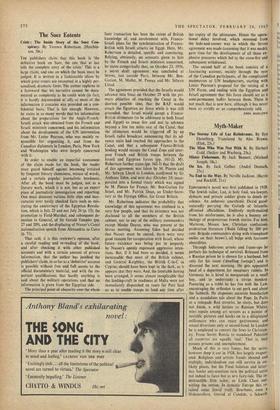The Suez Entente
THE publishers claim that this book is 'the definitive book on Suez, the one that at last tells the complete story of the crisis.' This is a large claim, and one on which the book must be judged. It is written in a fashionable idiom by which great events are recounted in a highly per- sonalised, dramatic form. The author explains in a foreword that his narrative cannot be docu- mented as completely as he could wish (in fact, it is hardly documented• at all), as most of the information it contains was provided on a con- fidential basis. That is fair enough: However, he states in so many words that his information about the preparations for the Anglo-French Israeli attack was obtained from the French and Israeli ministers concerned, and his information about the development of the UN intervention from Mr. Lester Pearson, who was mainly re- sponsible for organising it, and from the Canadian diplomats in London, Paris, New York and Washington who were largely concerned with it.
In order to enable an impartial assessment of the claim made for. the book, the reader must guard himself against becoming, irritated by frequent literary cluinsiness, misuse of words, and a certain popular journalistic brashness. After all, the book must be judged, not as a, literary work, which it is not, but as an expert piece of journalistic investigation and reporting. One must discount various little slips and inac- curacies over easily checked facts such. as mis- stating the anniversary of the Egyptian Revolu- tion, which is July. 23 and not July 26 (p. 13), the promotion to Field-Marshal, and subsequent de- motion to General, of Sir Gerald Tempter (pp. 27 and 209), and the displacing of Nasser's Canal nationalisation speech from Alexandria. to Cairo 71).
That said, it is this reviewer's opinion, after a careful reading and re-reading of the book, and after checking it with other published accounts and with a certain amount of private information, that the author has justified the publishers' claim, in so far as a 'definitive' account is possible without free and full access to the official documentary material, and with the im- portant qualifications that hardly anything is said about the military operations and that no information is given from the Egyptian side.
The principal point of obscurity over the whole
Suez transaction has been the extent of British knowledge of, and involvement with, Franco- Israeli plans for the synchronisation of Franco- British with Israeli attacks on Egypt. Here, Mr. Robertson is detailed, specific and convincing. Relying, obviously, on accounts given to him by, the French ,and Israeli ministers concerned, he states categorically that, on October 23, 1956, a secret draft agreement was concluded at Sevres, just outside Paris, between Mr.. Ben- Gurion, M. Mollet, M. Pineau and Mr. Selwyn Lloyd.
The agreement provided that the Israelis would advance into Sinai on October 29 with the pri- mary objective of reaching the Canal in the shortest possible time, that the RAF would attack the Egyptian air force while it was still grounded, that Israel would accept a Franco- British ultimatum (to be addressed to both Israel and Egypt) to cease fire and not to advance beyond a line ten miles east of the Canal, that the ultimatum would be triggered off by an Israeli radio broadcast announcing that its ad- vance units had reached the approaches to the Canal, and that a subsequent Franco-British landing would occupy the Canal Zone and inter- pose French and British troops beiween the Israeli and Egyptian forces (pp. 161-2). Mr. Robertson further states (pp. 162-3) that the draft of this agreement was taken by M. Pineau and Mr. Selwyn Lloyd to London, confirmed by Sir Anthony Eden, and next day (October 24) incor- porated into a formal treaty which was signed by M. Pineau for France, Mr. Ben-Gurion for Israel, and Mr. Patrick Dean, an Under-Secre- tary at the Foreign Office, for Great Britain.
Mr. Robertson indicates the probability that knowledge of this agreement was confined to a very few people, and that its existence was not disclosed to all the members of the British cabinet, nor to any of the military, commanders except Moshe Dayan, who was present at the Sevres meeting. Assuming Eden • had decided that Nasser must be ousted, there were very good reasons for co-operation with Israel, whose future . existence was being put in jeopardy by Nasser's openly expressed aggressive .inten- tions. But, if it had been so decided, it seems inexcusable that most of the British cabinet, and General Keightley, the British C-in-C in Cyprus, should have been kept in the dark, as it appears that they were. And, the timetable having been arranged, it seems almost inexplicable that the landing-craft in readiness' at Malta were not immediately dispatched en route for Port Said so as to enable troops to land any time after
the expiry of the ultimatum. Hence the opera- tional delay involved, which stemmed from the hole-and-corner way in which the Sevres agreement was made (assuming that it was made), gave time for the development of all those ex- plosive pressures which led to the cease-fire and subsequent withdrawal.
The second half of the book consists of a fascinating account, mainly through the eyes of the Canadian participants, of the complicated manoeuvres at UN headquarters, starting with Lester Pearson's proposal for the raising of a UN Force, and ending with the Egyptian and Israeli agreement that this force should act as a semi-permanent buffer between them. There is not much that is new here, although it has never been so vividly or so comprehensively told.
JOHN MARLOWE


































 Previous page
Previous page